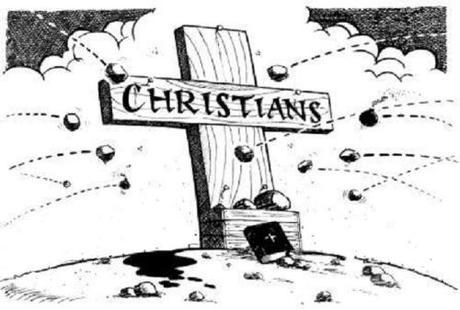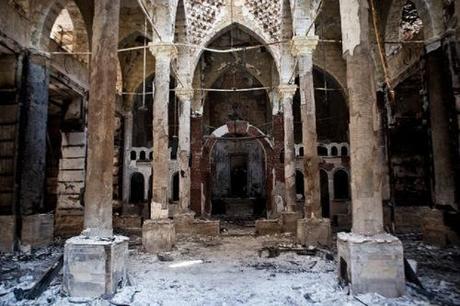
The Catholic concept of the “Church Suffering” refers to Christians being martyred for their faith.
George Weigel writes for First Things, Oct. 30, 2013, that alas, few Christians in the West seem aware of the Suffering Church, much less have it weigh on their Christian conscience.
Christians today live in the greatest tribulation-time in Christian history. More Christians were killed for fidelity to Christ in the 20th century than in the previous nineteen centuries of Christian history combined.
Wiegel cites the following examples of persecution from a recent issue of Touchstone:
- Some 1,200 Protestants are being imprisoned in shipping containers in Eritrean desert camps where “torture is routine”.
- Mostafa Bordbar, a 27-year-old Christian convert, was arrested and charged with “illegal gathering and participating in a house church” in Iran.
- Kazakh Christians, many of them converts from Islam, are “encouraged,” by the arrest and imprisonment of their pastors, to refrain from evangelism.
- A Muslim leader in central Nigeria regularly abducts Christian girls and women and holds them captive in his home, to compel their conversion (or reversion) to Islam.
- In Syria and Egypt, Christians live in daily fear for their lives where it’s open season on Christians.
Wiegel would not say it. But as you can see from the examples above, Muslims are doing many of the persecution.
Wiegel warns that at the rate Christians are being persecuted and martyred in the Middle East, within two decades, perhaps less, Christianity may well cease to be a living ecclesial reality in many of the places where Christianity was born, not to mention the cities where sub-apostolic and patristic Christianity developed.
The sole exception to this pattern throughout the Middle East and North Africa is Israel.
Thus Tom Holland, a popular historian and author of The Forge of Christendom (an intriguing book exploring the ways the late first millennium’s expectation of an imminent End Time shaped the West’s triumph in the second millennium), said recently at a London press briefing that “In terms of the sheer scale of the hatreds and sectarian rivalries” afoot in the Middle East today, “we are witnessing something on the scale of horror of the European Thirty Years War.”
At that same briefing, Nina Shea, director of the Hudson Institute’s Religious Freedom Center in Washington, raised some pointed questions about western media ignorance—or worse—about this persecution. Shea noted that a fourth-century Coptic church dedicated to Our Lady was recently destroyed in Egypt, even though it was on a shortlist to be declared a UNESCO World Heritage Site. The church was 200 years older than the UNESCO-listed Bamiyan Buddhas in Afghanistan, whose destruction by the Taliban in 2001 was widely reported and universally condemned; yet the mainstream media treated this grotesque act of anti-Christian religious and cultural vandalism in Egypt as a non-event.

So what is to be done?
- Support those non-governmental agencies that work to sustain the pastoral life of Christianity in its historic birthplace.
- Demand that U.S. diplomacy take religious freedom in the Middle East more seriously.
- Pray for our persecuted brothers and sisters in Christ.
- And pray, publicly, for the conversion of the persecutors.
To that end, this blog, Fellowship of the Minds, will have a regular feature asking you to pray for a particular individual who is suffering from persecution somewhere in the world.
H/t my friend Sol
~Eowyn

